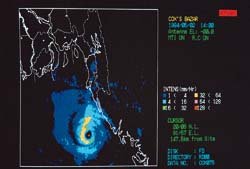Official Development Assistance (ODA)
11. Project for the Improvement of Weather Warning Services Related to Natural Disasters in Bangladesh
In April 1991, Bangladesh was devastated by a cyclone that left about 140,000 citizens dead or missing. In 1986, Japan initiated a grant aid project in Bangladesh to build a weather radar network and thereby equip the country with a stronger system for the issuance of weather forecasts and alerts in the event of cyclones or tornadoes. However, segments of the country's communication network were knocked out by gale winds and rain during the 1991 cyclone. This prevented the transmission of radar images to the Bangladesh Meteorological Department in Dhaka, ultimately adding to the overall scale of damage.
In the second phase of assistance, therefore, Japan decided to implement a Project for the Establishment of Microwave Link between Storm Warning Center, Dhaka and Radar Stations at Cox's Buzar and Khepupara (FY1992), and in the third phase, launched a Project for the Improvement of Weather Warning Service Related to Natural Disasters (FY1997). The phase two work succeeded in installing a microwave network capable of transmitting cyclone data in real time. Hence, when Bangladesh was struck again by a massive cyclone in 1994, the resulting damage was minimized to 0.1 percent of the scale suffered in 1991. Additionally, the new disaster warning system was designed to provide nationwide coverage, and is capable of issuing alerts not only on cyclones in the coastal areas, but also on flooding in the country's northern and inland districts. Since FY1993, Japan has provided Bangladesh with grant assistance for the construction of multipurpose cyclone shelters that normally function as elementary schools and as emergency evacuation shelters when the threat of cyclones or flooding looms.
These projects have earned high marks for their effectiveness in protecting human life and property in Bangladesh, and have been widely publicized by the World Meteorological Organization (WMO). International cooperation in the meteorological field can help prevent or minimize weather-related disasters in the developing world and complement efforts to monitor global warming and other manifestations of climactic change.

An image of the May 2, 1994 cyclone traced by Bangladesh's weather radar system.

An image of the May 2, 1994 cyclone traced by Bangladesh's weather radar system.
